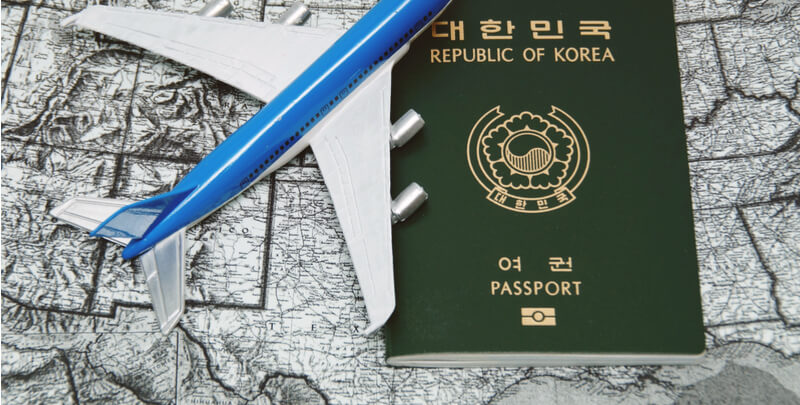Bank and public holidays in South Korea: 2017-2018 guide
South Korea is known by many in the international community to be a friendly, welcoming country that loves a good party. The same goes for holidays in South...

South Korea has had an industrial boom in the last decade, making their economy bigger, more stable and more attractive to foreigners. What was once a country with very few migrants has become a hotspot for foreigners because of their opportunity for jobs and newer immigration laws. It’s increasingly easier to get a work visa in South Korea, which means it’s easier to meet the requirements for the citizenship process.
Whether you’re hoping to form a business, find a new job or just start a new way of life, if you’re thinking of taking the plunge and obtaining a South Korean Citizenship this guide will walk you through the most important steps and points for doing so.
There’s no way to sugar coat it - obtaining a South Korean citizenship is pretty difficult. As such, it can seem easier to stay in the country on a permanent resident visa instead. That being said, there are a number of restrictions and inconveniences that come with holding and Alien Registration Certificate that can make the long and tedious citizenship application process worthwhile.
For instance, once you obtain a long-term visa in South Korea, any time you make a change in your lifestyle you’ll need to update your Registration Certificate with District Immigration within 14 days of the change. That can be a new job, a change of apartment, etc.
Additionally, Korean authorities won’t acknowledge dependent permits to non-married partners or same sex couples, though this hurdle remains true for citizenship applications as well.
Most importantly, long-term visa residents are required to get a Multiple Re-Entry Permit every time they arrive in or wish to depart South Korea in order to ensure their ability to return after their trip. Citizens, conversely, can travel freely on a South Korean passport.
In order to become a citizen of South Korea, most foreigners go through the naturalization process. There are three ways you can become a naturalized citizen of South Korea.
The first is called general naturalization. This type of citizenship only applies if you’ve never obtained Korean nationality in the past and if you have no family relation to a Korean. In order to qualify for general naturalization you must have lived in South Korea for more than five years consecutively. This means that you have to have a Korean address on file, an Alien Registration Card and the ability to work in South Korea. You must be a legal adult over 20 years old, you must be of good conduct (if you have a criminal record you'll be ineligible for citizenship), you must have the ability to maintain a living on your own (or you may be a dependent member of a family who can help you maintain a living) and you must have the same basic knowledge as a South Korean national. This knowledge includes an understanding of the Korean language, customs and culture.
The second type of naturalized citizenship is simple naturalization. This type of citizenship is generally used by foreigners who are of South Korean descent of some sort. In order to qualify for simple naturalization you must meet all the requirements of general naturalization (including requirements for good conduct, basic cultural knowledge and an ability to maintain a living), however, you need only to have lived in South Korea for three consecutive years. The biggest requirement for simple naturalization is that you must either have a parent who was a South Korean citizen in the past, have been born in South Korea with either parent also born in South Korea, be an adopted child of a South Korean citizen (if you were not of legal adult age at the time of adoption), or the foreign spouse of a South Korean citizen. If you’re married to a South Korean citizen and are seeking citizenship for yourself, you must have maintained your marriage status for the past two or more years.
The third and final type of naturalization is called special naturalization. There are many different types of special naturalization and all of these have different requirements and needs.
Most of the time you’ll be required to forfeit your foreign citizenship in order to obtain a South Korean citizenship. As recently as 2011, the South Korean government decided to grant a limited number of dual citizenships. It’s possible to obtain a dual citizenship if:
The application process for South Korean citizenship is extensive. Your completed application must include the following:
To prove your financial stability you may include a certificate from your bank showing you have a balance of more than KRW 30,000,000, a certificate of employment or a document from the Attorney General proving you’re a dependent. You must also include two letters of reference from someone with a professional title. This can be a member of a government, a professor, a lawyer, an executive or manager, the chief of a department or similar. You must also pay a fee of KRW 100,000 (approximately USD 88) for your application to be processed. If you’re funding the citizenship process from your account back home, use Wise to get the real exchange rate and cut out expensive international bank transfer fees.
Once you’ve submitted all the necessary documents to the South Korean immigration office, you’ll have a written examination. This exam will test your knowledge of South Korean history, politics, culture and customs. This test is a 20 question multiple choice test. Following the multiple choice exam you’ll be interviewed in order to test your proficiency in the language, as well as your attitude towards Korea and liberal democracy. In order to pass this section you must be at about level four on TOPIK - the Korean proficiency exam. This test is notoriously difficult - you even have to sing the first four verses of South Korea’s national anthem - without reading the lyrics off of a page. Of the 20,000 people who apply for South Korean citizenship annually, only 60% or so pass.
If you’re looking into South Korean citizenship for business reasons, you may apply for a D-8 Investor Visa. If you can invest KRW 300 million (approximately USD 282,000) into your own small business in South Korea you may be eligible. The South Korean government requires proof that the business is viable, however, when you renew the visa.
It may have been South Korea’s rich culture, thriving economy or kind people that attracted it to you in the first place, but no matter why you’re there it’s important to know your options when it comes to obtaining citizenship in South Korea. Good luck on becoming a citizen!
*Please see terms of use and product availability for your region or visit Wise fees and pricing for the most up to date pricing and fee information.
This publication is provided for general information purposes and does not constitute legal, tax or other professional advice from Wise Payments Limited or its subsidiaries and its affiliates, and it is not intended as a substitute for obtaining advice from a financial advisor or any other professional.
We make no representations, warranties or guarantees, whether expressed or implied, that the content in the publication is accurate, complete or up to date.

South Korea is known by many in the international community to be a friendly, welcoming country that loves a good party. The same goes for holidays in South...

South Korea is a popular destination for expats looking to relocate abroad. It's a major technology hub and has thriving cities like Seoul. There are many job...

As a senior, you must decide where you’re going to retire. South Korea is an exciting and modern option that many Western retirees consider. Whether you’re a...

Seoul has a large expat community drawn from all around the world, thanks to the large numbers of global businesses based there. IBM, Google and Toyota, for...

The excellent food, public transportation, internet infrastructure and safe culture have constantly drawn expats to South Korea. Now known widely as one of...

One important decision, if you’re moving to South Korea with family, is how to ensure that your children receive the best possible education. Luckily, South...